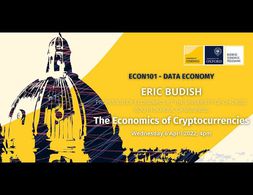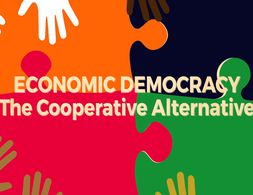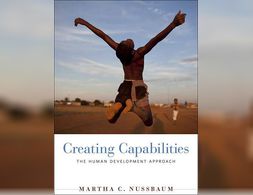✕
507 results
The lecturer focuses on his own paper The Economic Limits of Bitcoin and Anonymous Decentralized Trust on the Blockchain analysing the innovation of cryptocurrencies particularly bitcoin and its economic credibility The innovator of cryptocurrency Satoshi Nakamoto incorporated an interesting combination of computer sciences and economics The paper argues the limitations …
Sabel and Zeitlin present the persistence of small firms in Europe against the rise of mass production and modern enterprises Their article starts by analysing how mass production can be considered a historical necessity for the classical view as it is a highly specialized structure where man and machine can …
Mitch Jeserich interviews Professor Richard D Wolff a professor of economics at the New School University in New York City Prof Wolff presents an explanatory theory of how inflation occurs in an economy Briefly profit driven employers raise the price in order to maximize profits of private corporations they own …
This self-paced free course by Perry Merhling guides you to his "Money View" approach that integrates the fields of economics and finance. The course can easily be understood by people interested people without technical economic knowledge or training as it is primarily a tool for analysis.
Is capitalism the context where gender inequalities are reproduced, or is capitalism something more than a context? What are the differences among women and how can we place them theoretically and politically. Reproductive work, is it a women’s work? These questions are disscused in a three-session workshop.
Photo by Anne Nygård on Unsplash In this course you will learn all of the major principles of microeconomics normally taught in a quarter or semester course to college undergraduates or MBA students Perhaps more importantly you will also learn how to apply these principles to a wide variety of …
The workshop deals with the contribution of Plural Economics to the urgently needed change of the economic system towards sustainability and global responsibility.
After completing the module, participants should be able to demarcate and explain different economic approaches to sustainability. They should be able to evaluate the respective concepts based on their contribution to the ecological transformation of the economic system.
Understanding the financial crisis from four very different economic theories: Social Economics, Institutional Economics, Post Keynesian economics.
Identify the historical and cultural systems driving globalization and changing societies around the world.
How can we get people to save more money eat healthy foods engage in healthy behaviors and make better choices in general There has been a lot written about the fact that human beings do not process information and make decisions in an optimal fashion This course builds on much …
"Could a cooperative market economy, in which firms are owned and controlled by their workers, be a viable and efficient alternative to capitalism?"
Information and skills required to make more sustainable choices every day.
This MOOC (Massive Open Online Course) discusses Global Workers’ Rights and shows instruments and strategies which can be used to implement them.
From religious leaders to heads of state, everyone is talking about economic inequality. What form can such inequality take in different countries? What impact does it have on society? And why should it matter to you?
This course seeks to interpret capitalism using ideas from biological evolution. The lectures are foundational on neoclassical economics and economist, as well as their roles in the proliferation of capitalist ideology. However, it is less concerned with the ultimate judgment of capitalism than with the ways it can be shaped to fit more specific objectives.
This course provides a simple introduction to problems that social scientists are working on (e.g. racial disparities, inequality and climate change) in a manner that does not require any prior background in Economics or Statistics.
Neoliberalism is dead. Again. After the election of Trump and the victory of Brexit in 2016, many diagnosed the demise of the ideology of Margaret Thatcher, Ronald Reagan, Augusto Pinochet, and the WTO. Yet the philosophy of the free market and the strong state has an uncanny capacity to survive and even thrive in crisis.
Why is money more valuable than the paper on which it is printed Monetarists link the value of money to its supply and demand believing the latter depends on the total value of the commodities it circulates According to Prabhat Patnaik this logic is flawed In his view in any …
This book is about history of monetary economic thought. From the 18th century with Hume and Smith to the early 20th, the author explains the different schools of thought regarding the monetary theories and policies and specially the central banking theory.
How did the industrialized nations of North America and Europe come to be seen as the appropriate models for post-World War II societies in Asia, Africa, and Latin America? How did the postwar discourse on development actually create the so-called Third World? And what will happen when development ideology collapses? To answer these questions, Arturo Escobar shows how development policies became mechanisms of control that were just as pervasive and effective as their colonial counterparts.
In a capitalist system, consumers, investors, and corporations orient their activities toward a future that contains opportunities and risks. How actors assess uncertainty is a problem that economists have tried to solve through general equilibrium and rational expectations theory. Powerful as these analytical tools are, they underestimate the future's unknowability by assuming that markets, in the aggregate, correctly forecast what is to come.
This book introduces 40 critical pointers for those who wish to see the theory in a broader, more realistic context. The material is suitable for introductory and intermediate courses and can be included selectively by students for additional reading or in lectures or tutorials as discussion points. "Students of mainstream economics need a guide like this to help them understand the underlying assumptions, limitations and inbuilt biases of what they are studying. It helps them open their eyes to a broader view of how real economies work."
The Austrian School of Economics is an intellectual tradition in economics and political economy dating back to Carl Menger in the late-19th century. Menger stressed the subjective nature of value in the individual decision calculus. Individual choices are indeed made on the margin, but the evaluations of rank ordering of ends sought in the act of choice are subjective to individual chooser.
Geographical economics starts from the observation that economic activity is clearly not randomly distributed across space. This revised and updated introduction to geographical economics uses the modern tools of economic theory to explain the who, why and where of the location of economic activity. The text provides an integrated, first-principles introduction to geographical economics for advanced undergraduate students and first-year graduate students, and has been thoroughly revised and updated to reflect important developments in the field, including new chapters on alternative core models and policy implications.
The current global financial system may not withstand the next global financial crisis. In order to promote the resilience and stability of our global financial system against future shocks and crises, a fundamental reconceptualisation of financial regulation is necessary. This reconceptualisation must begin with a deep understanding of how today's financial markets, regulatory initiatives and laws operate and interact at the global level.
Taking as its starting point the interdependence of the economy and the natural environment, this book provides a comprehensive introduction to the emerging field of ecological economics.
This book presents recent thought on market efficiency, using a complex systems approach to move past equilibrium models and quantify the actual efficiency of markets.
Challenging the Mainstream in the Twentieth Century Economics is a contested academic discipline between neoclassical economics and a collection of alternative approaches such as Marxism radical economics Institutional economics Post Keynesian economics and others that can collectively be called heterodox economics Because of the dominance of neoclassical economics the existence …
Following an unprecedented economic boom fed by foreign investment, the Russian Revolution triggered the worst sovereign default in history. Bankers and Bolsheviks tells the dramatic story of this boom and bust, chronicling the forgotten experiences of leading financiers of the age.
One of the worlds leading economists of inequality, Branko Milanovic presents a bold new account of the dynamics that drive inequality on a global scale. Drawing on vast data sets and cutting-edge research, he explains the benign and malign forces that make inequality rise and fall within and among nations.
More Heat Than Light is a history of how physics has drawn some inspiration from economics and also how economics has sought to emulate physics, especially with regard to the theory of value. It traces the development of the energy concept in Western physics and its subsequent effect upon the invention and promulgation of neoclassical economics.
If a countrys Gross Domestic Product increases each year, but so does the percentage of its people deprived of basic education, health care, and other opportunities, is that country really making progress? If we rely on conventional economic indicators, can we ever grasp how the worlds billions of individuals are really managing?
We use cookies on our website. Click on Accept to help us to make Exploring Economics constantly better!


























